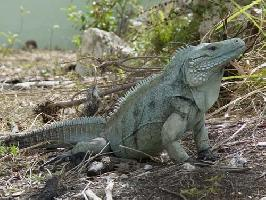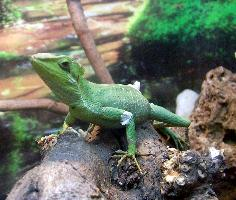
Váhy a míry
| Délka | 2 m |
|---|
Biologická data
| Délka života | od 12 do 20 let |
|---|
Popis zvířete
The Green Iguana, scientifically known as Iguana iguana, is a large, arboreal lizard native to Central and South America. This reptile is renowned for its striking appearance and has become a popular pet in many parts of the world. Adult Green Iguanas typically reach lengths of up to 5 to 7 feet, including their long, muscular tails, which constitute about half of their body length. Their size, combined with their distinctive physical features, makes them one of the most recognizable lizard species.One of the most notable characteristics of the Green Iguana is its vibrant green coloration, which provides excellent camouflage in its natural jungle and forest habitats. The intensity and shade of green can vary among individuals and can also change based on the iguana's mood, health, and environmental temperature. In addition to their green hue, these iguanas may display a range of colors including shades of blue, orange, and black, especially during the breeding season or as they age.
Green Iguanas possess a row of spines running along their back and tail, which serves as a defense mechanism against predators. They also have a large, round scale under their ears, known as a tympanum, which is used to detect sound. Another distinctive feature is the dewlap, a large flap of skin under their chin, which can be expanded to appear more intimidating to predators or during courtship displays.
These reptiles are primarily herbivorous, feeding on a wide variety of leaves, flowers, and fruits, though juvenile iguanas may consume insects or other small animals. Their strong, sharp teeth are well-adapted for tearing through tough plant material, and their digestive system is specially adapted to break down fiber-rich food.
Green Iguanas are excellent climbers and spend most of their time in the canopy of the rainforest. They are also skilled swimmers and can dive into water to escape predators. When threatened, they can drop from heights of up to 50 feet into water without injury. On land, they are capable of running on their hind legs to escape danger.
Reproduction in Green Iguanas involves complex courtship behaviors, with males displaying their physical prowess and bright colors to attract females. Females lay clutches of 20 to 70 eggs, which they bury in the ground. These eggs hatch after 10 to 15 weeks, and the young iguanas are independent from birth, receiving no care from their parents.
Despite their popularity as pets, Green Iguanas face several threats in the wild, including habitat destruction, hunting for their meat and skin, and predation. In some areas, they are considered invasive species, having been introduced by humans into environments where they compete with native species for resources.
In conclusion, the Green Iguana is a fascinating and complex creature, admired for its striking appearance and intriguing behaviors. Its adaptability to various environments, combined with a unique set of physical and behavioral traits, has made it a subject of interest for scientists, pet owners, and wildlife enthusiasts alike.
Podobná zvířata
Nové fotografie zvířat
Top 10 zvířat
- Dolphin gull (Leucophaeus scoresbii)
- Diana monkey (Cercopithecus diana)
- Stone loach (Barbatula barbatula)
- Japanese macaque (Macaca fuscata)
- Greek tortoise (Testudo graeca)
- Moustached guenon (Cercopithecus cephus)
- Galápagos tortoise (Geochelone nigra complex)
- Russian tortoise (Testudo horsfieldii)
- Galápagos penguin (Spheniscus mendiculus)
- Common flying dragon (Draco volans)


